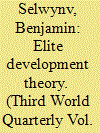| Srl | Item |
| 1 |
ID:
144265


|
|
|
|
|
| Summary/Abstract |
Much development theory is based upon elite-led conceptions of social change. Elite development theory (EDT) conceptualises ‘the poor’ as human inputs into or, at best, junior partners within elite-led development processes. This elitism contributes to the continual (re)framing of the poor as passive beneficiaries of elite policy, and legitimates economic exploitation of the poor. These claims are illustrated by discussing a number of EDT traditions – the Washington/Post-Washington Consensus, statist political economy, modernisation Marxism and varieties of pro-poor growth. As an alternative to EDT the article argues for a conception and practice of ‘labour-centred development’.
|
|
|
|
|
|
|
|
|
|
|
|
|
|
|
|
| 2 |
ID:
144279


|
|
|
|
|
| Summary/Abstract |
This article outlines the theory and practice of labour-centred development (LCD). Much development thinking is elitist, positing states and corporations as primary agents in the development process. This article argues, by contrast, that collective actions by labouring classes can generate tangible developmental gains and therefore that, under certain circumstances, they can be considered primary development actors. Examples of LCD discussed here include shack-dwellers’ movements in South Africa, the landless labourers’ movement in Brazil, unemployed workers’ movements in Argentina and large-scale collective actions by formal sector workers across East Asia. The article also considers future prospects for LCD.
|
|
|
|
|
|
|
|
|
|
|
|
|
|
|
|